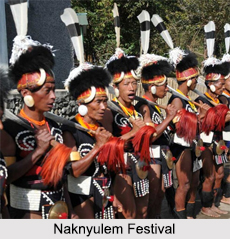 Naknyulem Festival is the most important festival celebrated by the Chang Naga Tribe in Nagaland. It is officially celebrated on 29th, 30th and 31st July. The period coincides with the first harvest of the season for the year. During this festival, the houses of Chang Nagas are decorated with a special kind of tree called "Ngunam".
Naknyulem Festival is the most important festival celebrated by the Chang Naga Tribe in Nagaland. It is officially celebrated on 29th, 30th and 31st July. The period coincides with the first harvest of the season for the year. During this festival, the houses of Chang Nagas are decorated with a special kind of tree called "Ngunam".
Origin of Naknyulem Festival
The originality and theme of the festival are closely shaped and inspired by the history of Nagaland. It was originally a religious ceremony to celebrate their deliverance from darkness. As so, it stands today un-wavered as ever as a ceremony that applauds victory of good over evil. It is a symbolic tribute that exercises customary beliefs with regards to their history. During this festival, people offer prayers and invoke God"s blessings with special rituals.
Legend of Naknyulem Festival
According to the Chang mythology, in ancient times, the world was engulfed by darkness for six consecutive days and nights. People were confined in their own homes as the darkness spread all over them. They burnt everything they had to suffice themselves with light to help in their resolve against darkness. But eventually they ran out of material fuel to keep the fire alight and so they burned the horns of cows, buffaloes and other animals that were hung outside their houses. After the 6th day, a man named "Namo Molo" killed a tiger that had been obstructing the light. Despite the engulfing darkness Namo Molo, dauntingly shot down the beast with his bow and arrow. And in that moment, the void filled darkness burst into daylight.
Celebration of Naknyulem Festival
Naknyulem Festival is celebrated every 11th month of Chang calendar which is at the end of July.
•The first day of the festival is known as "Wenshi". Women make steamed biscuits from rice and flour. As a traditional practice in the Chang Naga Tribe, the priest and aged male members of the village engage themselves in making Yan"s (tops) and Kongkin (mouth flute). It is believed that the Gods during this festival come down to earth to collect Yans and Wei. Hence, one pieces each of "Wei" and "Yan" is placed at the entrances of each house for the Gods at night.
•The second day of the festival is called "Youchem". This day is filled with many games including competitions and activities that livens the playful spirit.
•The third day of the festival is called "Nakseng". On this final day, men beat log drums from dawn till sunrise which indicates their victory against darkness. Old men sit in silence and listen to the chirping birds that bring good omen.



















